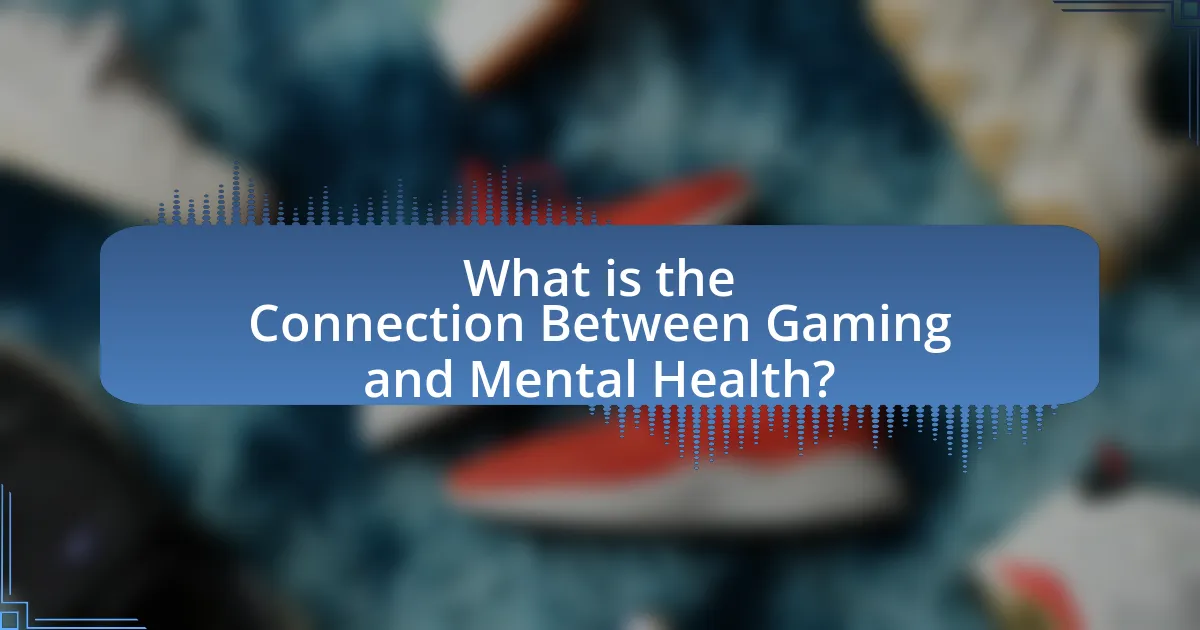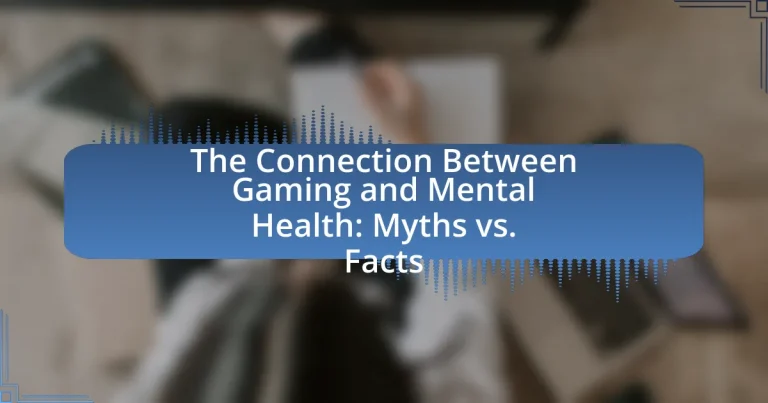The article examines the complex relationship between gaming and mental health, highlighting both positive and negative effects. It discusses how gaming can enhance cognitive skills, improve mood, and foster social connections, while also addressing the risks of addiction, anxiety, and depression associated with excessive gaming. Key topics include the psychological effects of gaming, common myths surrounding its impact on mental health, and strategies for maintaining a healthy balance in gaming habits. Additionally, the article provides insights into how gaming communities can support mental well-being and outlines available resources for individuals concerned about gaming-related mental health issues.

What is the Connection Between Gaming and Mental Health?
The connection between gaming and mental health is multifaceted, with both positive and negative impacts. Research indicates that gaming can enhance cognitive skills, improve mood, and foster social connections, which contribute positively to mental well-being. For instance, a study published in the journal “Computers in Human Behavior” found that playing video games can lead to increased feelings of social connectedness and reduced feelings of loneliness. Conversely, excessive gaming may lead to negative outcomes such as addiction, anxiety, and depression, as highlighted in a study by the American Psychological Association, which noted that problematic gaming behaviors are associated with higher levels of psychological distress. Thus, the relationship between gaming and mental health is complex, influenced by the amount and context of gaming.
How do gaming and mental health interact?
Gaming can have both positive and negative interactions with mental health. On one hand, gaming can serve as a form of stress relief and social connection, which can enhance mental well-being; studies have shown that engaging in multiplayer games can foster social interactions and reduce feelings of loneliness. For instance, research published in the journal “Computers in Human Behavior” found that online gaming can improve social skills and provide emotional support among players. Conversely, excessive gaming can lead to negative outcomes such as addiction, increased anxiety, and depression. The World Health Organization recognizes gaming disorder as a mental health condition, highlighting the potential for gaming to adversely affect mental health when it becomes compulsive. Thus, the interaction between gaming and mental health is complex, influenced by the amount of time spent gaming and the nature of the gaming experience.
What are the psychological effects of gaming on individuals?
The psychological effects of gaming on individuals include both positive and negative outcomes. Positive effects can manifest as improved cognitive skills, such as problem-solving abilities and enhanced memory, as evidenced by research from the University of California, Irvine, which found that action games can improve visual attention and spatial skills. Conversely, negative effects may include increased aggression, social isolation, and addiction, as highlighted in a study published in the journal “Psychological Bulletin,” which indicated a correlation between excessive gaming and heightened aggression in adolescents. Thus, gaming can significantly influence mental health, with outcomes varying based on the nature and extent of gaming engagement.
How can gaming influence emotional well-being?
Gaming can positively influence emotional well-being by providing an avenue for stress relief, social connection, and cognitive engagement. Research indicates that playing video games can lead to improved mood and reduced anxiety levels, as players often experience a sense of accomplishment and escape from daily stressors. A study published in the journal “Computers in Human Behavior” found that individuals who engage in gaming report higher levels of life satisfaction and lower levels of depression. Additionally, multiplayer games foster social interactions, which can enhance feelings of belonging and support, further contributing to emotional resilience.
What are common myths about gaming and mental health?
Common myths about gaming and mental health include the belief that gaming causes violence, leads to social isolation, and negatively impacts cognitive development. Research from the American Psychological Association indicates that while some studies suggest a correlation between violent video games and aggressive behavior, the evidence is not definitive and often overlooks other contributing factors. Additionally, contrary to the myth that gaming leads to social isolation, studies show that online gaming can foster social connections and community engagement. Furthermore, research published in the journal “Frontiers in Psychology” demonstrates that gaming can enhance cognitive skills such as problem-solving and multitasking, challenging the notion that it harms cognitive development.
Why do people believe that gaming causes violence?
People believe that gaming causes violence due to a combination of media portrayal, anecdotal evidence, and psychological theories linking aggressive behavior to violent video games. Research has shown that high-profile incidents of violence, such as school shootings, often lead to scrutiny of video games played by the perpetrators, creating a narrative that associates gaming with real-world aggression. For instance, a study published in the journal “Psychological Bulletin” by Anderson and Dill in 2000 found a correlation between violent video game exposure and increased aggression in players. This correlation fuels public perception, despite numerous studies indicating that the majority of gamers do not engage in violent behavior.
How does the stereotype of gamers affect perceptions of mental health?
The stereotype of gamers as socially isolated and mentally unstable negatively affects perceptions of mental health by reinforcing stigma and misconceptions. This stereotype leads to the belief that gaming is inherently linked to poor mental health outcomes, despite research indicating that gaming can have positive effects, such as improved cognitive skills and social connections. For instance, a study published in the journal “Computers in Human Behavior” found that online gaming can foster social interaction and community, countering the stereotype of isolation. Consequently, these misconceptions can discourage individuals from seeking help for mental health issues, as they may fear being judged or labeled based on the gamer stereotype.
What are the facts surrounding gaming and mental health?
Gaming can have both positive and negative effects on mental health. Research indicates that moderate gaming can enhance cognitive skills, improve mood, and foster social connections, while excessive gaming may lead to addiction, anxiety, and depression. A study published in the journal “Psychological Medicine” found that individuals who engage in gaming for more than three hours a day are at a higher risk of developing mental health issues. Conversely, another study in “Computers in Human Behavior” highlighted that gaming can serve as a stress relief mechanism and improve emotional well-being when played in moderation. These findings illustrate the complex relationship between gaming and mental health, emphasizing the importance of balance in gaming habits.
What research supports the positive effects of gaming on mental health?
Research indicates that gaming can have positive effects on mental health, particularly in enhancing mood and reducing symptoms of anxiety and depression. A study published in the journal “Computers in Human Behavior” by Przybylski and Weinstein (2019) found that moderate gaming is associated with improved well-being and social connection. Additionally, a meta-analysis in “Psychological Bulletin” by Kowert et al. (2015) highlighted that gaming can foster social interaction and provide a sense of community, which are crucial for mental health. Furthermore, research from the University of Oxford in 2020 demonstrated that playing video games can lead to increased happiness and life satisfaction, particularly when games are played in moderation. These studies collectively support the notion that gaming, when approached healthily, can contribute positively to mental health outcomes.
How can gaming serve as a therapeutic tool?
Gaming can serve as a therapeutic tool by providing immersive experiences that promote emotional regulation, social interaction, and cognitive engagement. Research indicates that video games can reduce symptoms of anxiety and depression; for instance, a study published in the journal “Cyberpsychology, Behavior, and Social Networking” found that engaging in video games can lead to improved mood and reduced stress levels. Additionally, games designed for therapeutic purposes, such as “SPARX,” have been shown to effectively treat depression in adolescents by teaching coping skills through interactive gameplay. These findings highlight the potential of gaming as a valuable resource in mental health treatment.
How can gaming impact social interactions and relationships?
Gaming can significantly impact social interactions and relationships by fostering connections among players and enhancing communication skills. Multiplayer games often require teamwork and collaboration, which can lead to the formation of friendships and social networks. Research indicates that 70% of gamers report that gaming helps them connect with others, as highlighted in a study by the Pew Research Center, which found that online gaming communities can provide social support and a sense of belonging. Additionally, gaming can improve interpersonal skills, as players learn to communicate effectively and navigate social dynamics within the game environment.
What role does online gaming play in building social connections?
Online gaming plays a significant role in building social connections by providing a platform for players to interact, collaborate, and form friendships. Research indicates that approximately 70% of gamers report that they have made friends through online gaming, highlighting its effectiveness as a social tool. Games often require teamwork and communication, fostering a sense of community among players. Additionally, online gaming environments can reduce feelings of isolation, as players engage with others who share similar interests, thus enhancing their social networks.
How can gaming communities support mental health?
Gaming communities can support mental health by providing social connections, emotional support, and a sense of belonging. These communities often foster friendships and interactions that can reduce feelings of isolation, which is crucial for mental well-being. Research indicates that social engagement in gaming can lead to improved mood and decreased anxiety levels, as players often share experiences and provide encouragement to one another. For instance, a study published in the journal “Computers in Human Behavior” found that online gaming can enhance social skills and create supportive networks, which are beneficial for mental health.
What are the potential risks of gaming on mental health?
Gaming can pose several potential risks to mental health, including increased anxiety, depression, and social isolation. Research indicates that excessive gaming can lead to addictive behaviors, which may exacerbate pre-existing mental health conditions. A study published in the journal “Psychological Medicine” found that individuals who engage in high levels of gaming are more likely to experience symptoms of depression and anxiety compared to those who game less frequently. Additionally, prolonged gaming sessions can disrupt sleep patterns, further contributing to mental health issues.
How can excessive gaming lead to negative mental health outcomes?
Excessive gaming can lead to negative mental health outcomes by contributing to increased anxiety, depression, and social isolation. Research indicates that individuals who engage in prolonged gaming sessions often experience heightened levels of stress and emotional distress, which can exacerbate existing mental health issues. A study published in the journal “Psychological Medicine” found that excessive gaming is associated with a 50% increase in the likelihood of developing depression and anxiety disorders. Additionally, excessive gaming can disrupt sleep patterns and reduce physical activity, both of which are critical for maintaining mental well-being.
What signs indicate unhealthy gaming habits?
Signs that indicate unhealthy gaming habits include neglecting responsibilities, experiencing withdrawal symptoms when not gaming, and prioritizing gaming over social interactions and physical activities. Research shows that individuals who spend excessive time gaming may exhibit decreased academic or work performance, as well as increased irritability and mood swings when unable to play. Additionally, the World Health Organization recognizes gaming disorder as a mental health condition characterized by impaired control over gaming, leading to significant distress or impairment in personal, social, or occupational functioning.
How can individuals balance gaming and mental health?
Individuals can balance gaming and mental health by setting time limits on gaming sessions and prioritizing other activities. Research indicates that excessive gaming can lead to negative mental health outcomes, such as increased anxiety and depression, while moderate gaming can provide social interaction and stress relief. A study published in the journal “Computers in Human Behavior” found that individuals who engage in gaming for less than two hours a day report higher levels of well-being compared to those who game excessively. Therefore, establishing boundaries and ensuring a balanced lifestyle can help maintain mental health while enjoying gaming.
What strategies can gamers use to maintain a healthy relationship with gaming?
Gamers can maintain a healthy relationship with gaming by setting time limits on their gaming sessions. Establishing specific durations for gameplay helps prevent excessive gaming, which can lead to negative mental health outcomes such as anxiety and depression. Research indicates that individuals who engage in structured gaming habits report higher levels of satisfaction and lower levels of stress compared to those who play without limits. Additionally, incorporating regular breaks during gaming sessions can enhance focus and reduce fatigue, further supporting mental well-being.
How can parents support their children’s gaming habits for better mental health?
Parents can support their children’s gaming habits for better mental health by establishing healthy boundaries and promoting balanced gaming practices. Setting time limits on gaming can prevent excessive play, which is linked to negative mental health outcomes, such as increased anxiety and depression. Research indicates that children who engage in moderate gaming, typically defined as one to two hours per day, report better emotional well-being compared to those who play excessively. Additionally, parents can encourage social gaming experiences that foster teamwork and communication, which can enhance social skills and reduce feelings of isolation. Engaging in discussions about the content of games can also help children process their experiences and emotions, further supporting their mental health.
What resources are available for gamers concerned about mental health?
Gamers concerned about mental health can access various resources, including online support groups, mental health hotlines, and specialized therapy services. Online platforms like Discord and Reddit host communities where gamers can share experiences and seek advice, fostering peer support. Mental health hotlines, such as the National Suicide Prevention Lifeline, provide immediate assistance and guidance. Additionally, organizations like Take This offer resources specifically tailored for gamers, including articles, workshops, and mental health awareness campaigns. These resources are validated by studies indicating that community support and professional help can significantly improve mental well-being among gamers.
Where can individuals find support for gaming-related mental health issues?
Individuals can find support for gaming-related mental health issues through various resources such as mental health hotlines, online therapy platforms, and gaming communities that focus on mental well-being. For instance, organizations like the National Alliance on Mental Illness (NAMI) provide resources and support specifically tailored for individuals facing mental health challenges, including those related to gaming. Additionally, platforms like BetterHelp and Talkspace offer online therapy options that can address gaming-related stress and anxiety. Research indicates that community support, such as forums and groups dedicated to mental health in gaming, can also provide valuable peer support and coping strategies.
What organizations focus on the intersection of gaming and mental health?
Organizations that focus on the intersection of gaming and mental health include the American Psychological Association (APA), which conducts research on the psychological effects of gaming, and the Entertainment Software Association (ESA), which promotes the positive aspects of gaming. Additionally, the Video Game Accessibility Alliance (VGAA) works to make games more accessible for individuals with mental health challenges. These organizations provide resources, research, and advocacy to better understand and support the mental health implications of gaming.
What best practices can enhance the positive effects of gaming on mental health?
Engaging in gaming with moderation and purpose enhances its positive effects on mental health. Setting time limits on gaming sessions can prevent excessive play, which is linked to negative mental health outcomes. Additionally, choosing games that promote social interaction, such as multiplayer or cooperative games, can foster connections and reduce feelings of isolation, which is supported by research indicating that social gaming can improve mood and well-being. Furthermore, selecting games that challenge cognitive skills, such as puzzles or strategy games, can enhance problem-solving abilities and provide a sense of accomplishment, contributing to improved self-esteem.


